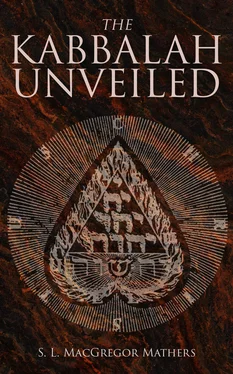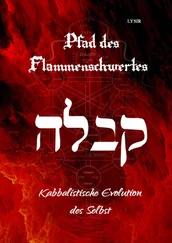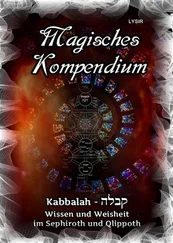(δ) The destiny of man and angels.
(ε) The nature of the soul.
(ζ) The nature of angels, demons, and elementals.
(η) The import of the revealed law.
(θ) The transcendental symbolism of numerals.
(ι) The peculiar mysteries contained in the Hebrew letters.
(κ) The equilibrium of contraries.
29. The "Book of Concealed Mystery" opens with these words: "The Book of Concealed Mystery is the book of the equilibrium of balance." What is here meant by the terms "equilibrium of balance"? Equilibrium is that harmony which results from the analogy of contraries, it is the dead centre where, the opposition of opposing forces being equal in strength, rest succeeds motion. It is the central point. It is the "point within the circle" of ancient symbolism. It is the living synthesis of counterbalanced power. Thus form may be described as the equilibrium of light and shade; take away either factor, and form is viewless. The term balance is applied to the two opposite natures in each triad of the Sephiroth, their equilibrium forming the third Sephira in each ternary. I shall recur again to this subject in explaining the Sephiroth. This doctrine of equilibrium and balance is a fundamental qabalistical idea.
30. The "Book of Concealed Mystery" goes on to, state that this "Equilibrium hangeth in that region which is negatively existent." What is negative existence? What is positive existence? The distinction between these two is another fundamental idea. To define negative existence clearly is impossible, for when it is distinctly defined it ceases to be negative existence ; it is then negative existence passing into static condition. Therefore wisely have the Qabalists shut out from mortal comprehension the primal AIN, Ain , the negatively existent One, and the AIN SVP, Ain Soph , the limitless Expansion; while of even the AIN SVP AVR, Ain Soph Aur , the illimitable Light, only a dim conception can be formed. Yet, if we think deeply, we shall see that such must be the primal forms of the unknowable and nameless One, whom we, in the more manifest form speak of as GOD. He is the Absolute. But how define the Absolute? Even as we define it, it slips from our grasp, for it ceases when defined to be the Absolute. Shall we then say that the Negative, the limitless, the Absolute are, logically speaking, absurd, since they are ideas which our reason cannot define? No; for could we define them, we should make them, so to speak, contained by our reason, and therefore not superior to it; for a subject to be capable of definition it is requisite that certain limits should be assignable to it. How then can we limit the Illimitable?
31. The first principle and axiom of the Qabalah is the name of the Deity, translated in our version of the Bible, "I am that I am," AHIH AShR AHIH, Eheieh Asher Eheieh . A better translation is, "Existence is existence," or "I am He who is."
32. Eliphaz Levi Zahed, that great philosopher and Qabalist of the present century, says in his "Histoire de la Magie" (bk. i. ch. 7): "The Qabalists have a horror of everything that resembles idolatry; they, however, ascribe the human form to God, but it is a purely hieroglyphical figure. They consider God as the intelligent, living, and loving Infinite One. He is for them neither the collection of other beings, nor the abstraction of existence, nor a philosophically definable being. He is in all, distinct from all, and greater than all. His very name is ineffable; and yet this name only expresses the human ideal of His Divinity. What God is in Himself it is not given to man to know. God is the absolute of faith; existence is the absolute of reason, existence exists by itself, and because it exists. The reason of the existence of existence is existence itself. We may ask, 'Why does any particular thing exist?' that is, 'Why does such or such a thing exist?' But we cannot ask, without its being absurd to do so, Why does existence exist?' For this would be to suppose existence prior to existence." Again, the same author says ( ibid . bk. iii. ch. 2): "To say, 'I will believe when the truth of the dogma shall be scientifically proved to me,' is the same as to say, 'I will believe when I have nothing more to believe, and when the dogma shall be destroyed as dogma by becoming a scientific theorem.' That is to say, in other words: 'I will only admit the Infinite when it shall have been explained, determined, circumscribed, and defined for my benefit; in one word, when it has become finite. I will then believe in the Infinite when I am sure that the Infinite does not exist. I will believe in the vastness of the ocean when I shall have seen it put into bottles.' But when a thing has been clearly proved and made comprehensible to you, you will no longer believe it--you will know it."
33. In the "Bhagavadgîtâ," ch. ix., it is said: "I am Immortality and also death; and I, O Arguna! am that which is and that which is not." 1And again (ch. ix.): "And, O descendant of Bharata! see wonders in numbers, unseen before. Within my body, O Gudâkesa! see to-day the whole universe, including everything movable and immovable, all in one." And again ( ibid .) Arguna said: "O Infinite Lord of the Gods! O Thou who pervadest the universe! Thou art the Indestructible, that which is, that which is not, and what is beyond them. Thou art the Primal God, the Ancient One; Thou are the highest support of this universe. By Thee is this universe pervaded, O Thou of the infinite forms . . . . Thou art of infinite power, of unmeasured glory; Thou pervadest all, and therefore Thou art all!"
34. The idea of negative existence can then exist as an idea , but it will not bear definition, since the idea of definition is utterly incompatible with its nature. "But," some of my readers will perhaps say, "your term negative existence is surely a misnomer; the state you describe would be better expressed by the title of negative subsistence." Not so, I answer; for negative subsistence can never be anything but negative subsistence; it cannot vary, it cannot develop; for negative subsistence is literally and truly no thing . Therefore, negative subsistence cannot be at all; it never has existed, it never does exist, it never will exist. But negative existence bears hidden in itself, positive life; for in the limitless depths of the abyss of its negativity lies hidden the power of standing forth from itself, the power of projecting the scintilla of the thought unto the utter, the power of re-involving the syntagma into the inner. Thus shrouded and veiled is the absorbed intensity in the centreless whirl of the vastness of expansion. Therefore have I employed the term "Ex-sto," rather than "Sub-sto."
35. But between two ideas so different as those of negative and positive existence a certain nexus, or connecting-link, is required, and hence we arrive at the form which is called potential existence, which while more nearly approaching positive existence, will still scarcely admit of clear definition. It is existence in its possible form. For example, in a seed, the tree which may spring from it is hidden; it is in a condition of potential existence; is there; but it will not admit of definition. How much less, then, will those seeds which that tree in its turn may yield. But these latter are in a condition which, while it is somewhat analogous to potential existence, is in hardly so advanced a stage; that is, they are negatively existent.
36. But, on the other hand, positive existence is always capable of definition; it is dynamic; it has certain evident powers, and it is therefore the antithesis of negative existence, and still more so of negative subsistence. It is the tree, no longer hidden in the seed, but developed into the outer. But positive existence has a beginning and an end, and it therefore requires another form from which to depend, for without this other concealed negative ideal behind it, it is unstable and unsatisfactory.
Читать дальше












